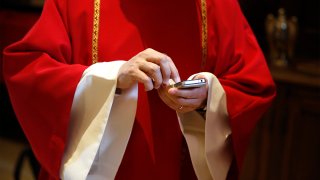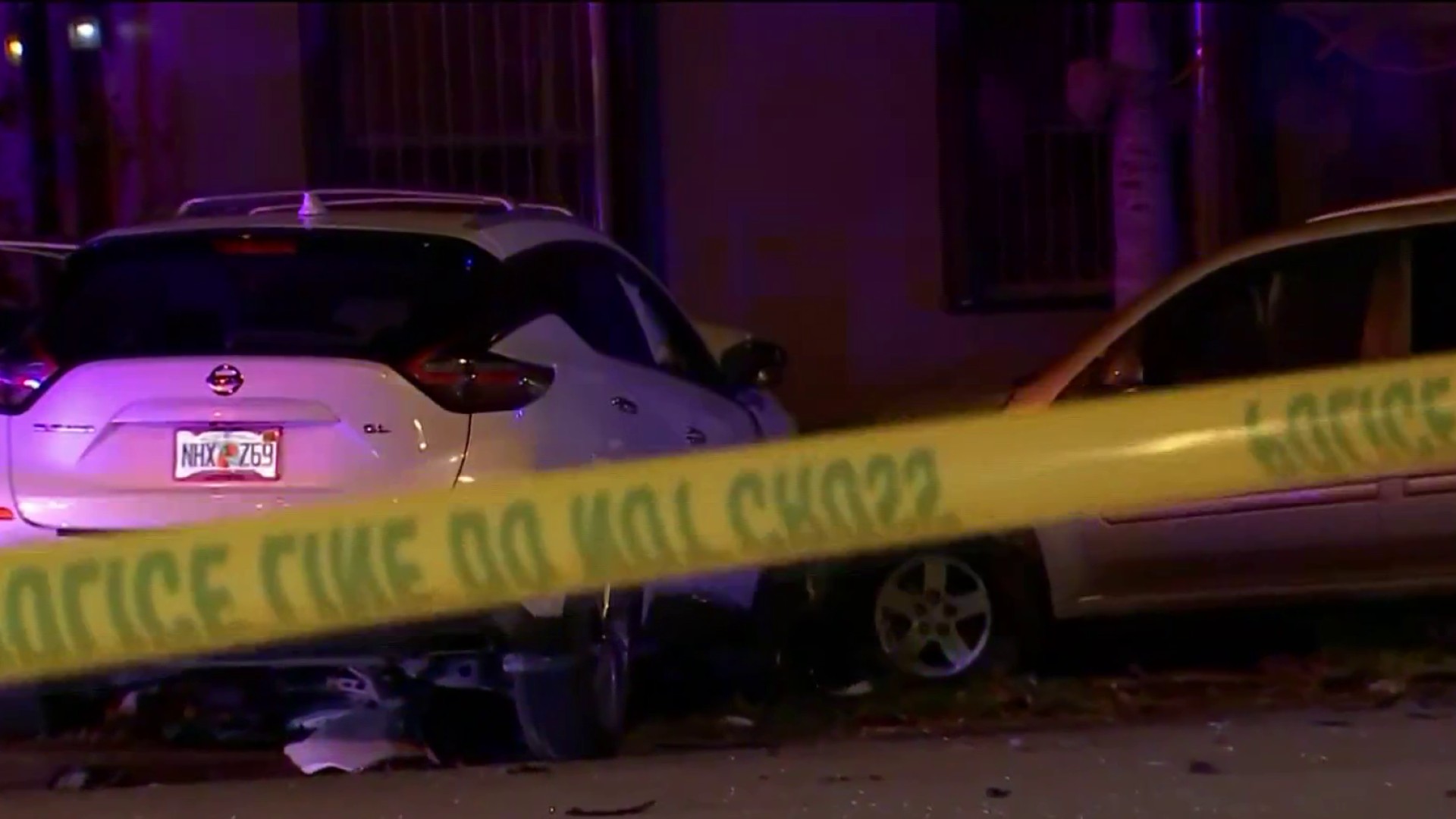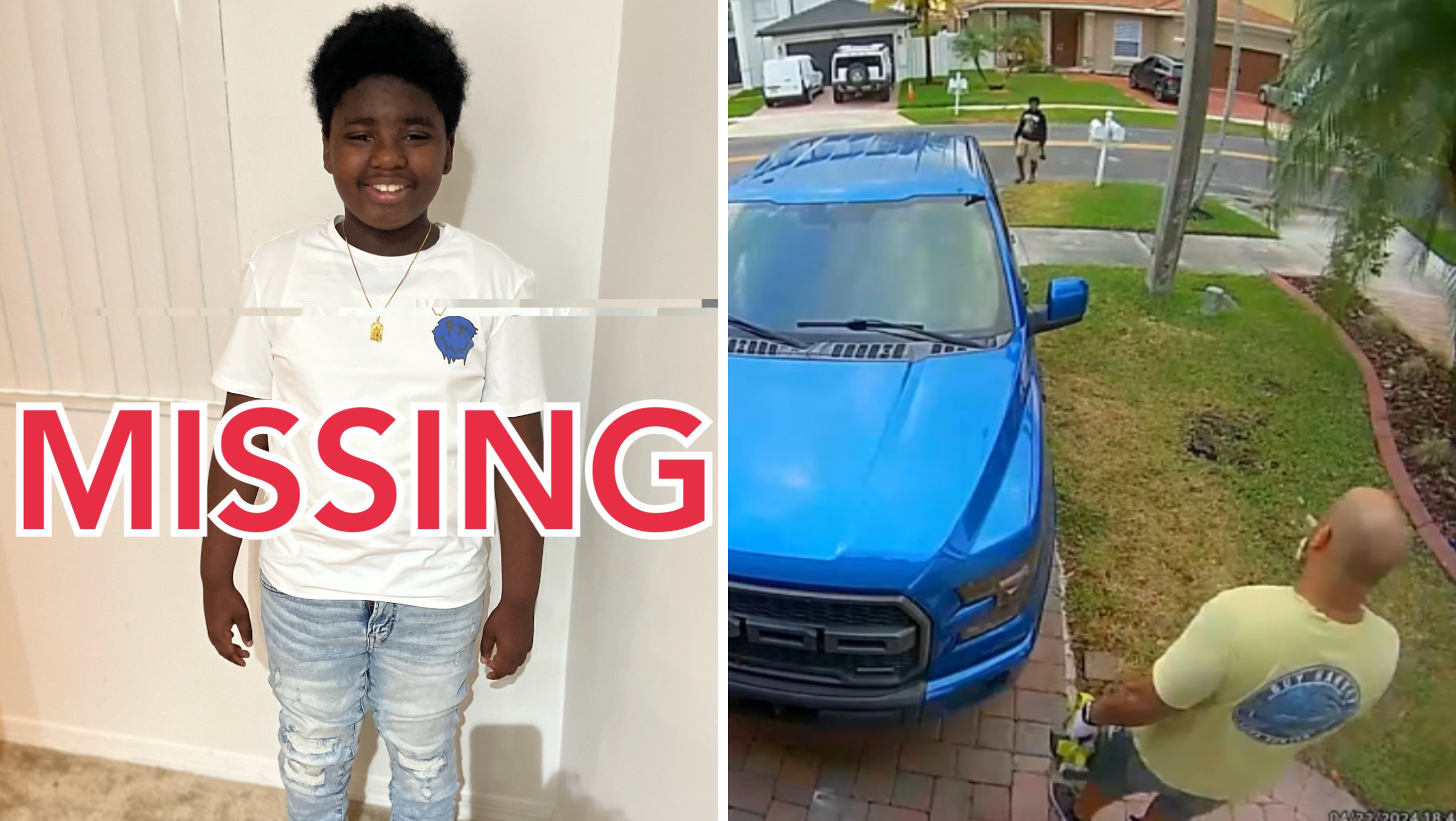
The priest’s cellphone buzzed again as he was visiting coronavirus patients.
An hour earlier that day, April 1, he had given last rites to yet another COVID-19 patient at JFK Medical Center in West Palm beach. But now he was needed again, in another room in the intensive care unit.
So the Rev. Gabriel Ghanoum repeated his routine — solemn, courageous and tragically all too familiar — as a humble and technologically savvy hospital chaplain on the front lines of the coronavirus pandemic.
He slipped his freshly scrubbed hands inside surgical gloves. He pulled a hospital gown over his cleric’s collar. He shrouded his face with protective masks.
Get South Florida local news, weather forecasts and entertainment stories to your inbox. Sign up for NBC South Florida newsletters.
And as he walked into a room where the only sounds were the woosh and hum of a ventilator, he pulled out his smartphone. It was sealed inside a clear sandwich bag.
Pressing buttons through plastic, he dialed a woman in Austin, Texas, patched her brother in Atlanta onto the call and put them on speakerphone.
With his left hand, he raised the phone above the face of Tom Craciun, 77, a champion swimmer in his prime now in the final moments of a losing battle with the deadly respiratory disease.
Local
His gloved right hand holding Craciun’s, he recited the Sacrament of the Sick — “Our Lord Jesus Christ who promised through the apostle James, is there anyone sick among you? ...”
When he finished, he stood in silence. And the voices of grieving children and grandchildren, crying out of his phone from the seclusion of their homes in two different states, said final goodbyes.
Then the priest hung up his phone. Alone now with a nurse and the patient, he sang through his face mask a spiritual hymn — “I have decided to follow Jesus ... no turning back ... the world behind me, the cross before me. ...”
“I kept singing until his last breath,″ the priest later recalled.
When it was over, after Craciun had peacefully “transitioned” (he doesn’t say the word “died”), the priest headed back to the main floor, his phone tucked inside his pocket.
About an hour later, it would buzz again.
‘LIKE HE CAME DOWN FROM HEAVEN’
Father Gabriel, as Ghanoum has come to be known in his nine years as JFK’s hospital chaplain, has the name of an angel. And that’s exactly what he is to so many grieving relatives barred from the hospital because of strict visitor prohibitions due to the risk of COVID-19.
Unable to physically be present for a loved one’s final moments, they at least get some semblance of closure, virtual yet emotional, thanks to the brave and selfless act of a man they’ve never met.
“The most wonderful priest, like he came down from heaven,” Craciun’s daughter, Nancy Jean Pierce, would later say.
But Father Gabriel is also a mortal, a 67-year-old man not immune to an invisible disease that has killed more than 100 people, most of them elderly, in Palm Beach County since March 14.
Twenty-one of the county’s first 112 deaths were at JFK, records from the Palm Beach County Medical Examiner’s Office show. Ghanoum said he has administered last rites to about 10 of the hospital’s COVID patients.
“Every experience is very humbling and very powerful,” he said, “because you come to know the legacies, the stories, of the dying, but also of the living. You become the spiritual and emotional archivist.”
It’s dangerous, too.
Across the world, including South Florida, COVID-19 has claimed people battling it on the front lines — doctors, nurses, police officers and firefighters, even spiritual advisers. In Italy, the disease’s first Western epicenter after the virus was first detected in Wuhan, China, in December, nearly 100 priests have died from COVID-19.
Ghanoum said he’s not aware of local priests who may have died after contracting the disease while praying with coronavirus patients.
But he said he considers it not only his duty but a privilege to cover up in protective personal equipment and serve alongside “the courageous doctors and nurses at JFK.”
“The moment you have fear, then you cannot be near,” he said. “You have to have trust in what you are doing. The main goal is bringing in the family that cannot see their loved ones and telling them, ‘We are in it together. You are not alone.’”
‘NO ONE DIES ALONE’
At many hospitals, chaplains offer counsel and prayer from the safety of a phone or from behind a door, taking no chances on a disease that strikes silently and suddenly.
Ghanoum said he respects his spiritual peers who take such precautions. He prefers a more creative approach, one that uses technology to both prevent what he calls “the disease of separation” and promote JFK’s motto during the crisis: “No one dies alone.”
“If my loved one is in the hospital and I cannot see him or her and be present with them, that really is adding to my suffering,” he said. “When families are separated from their loved one, it can become like a disease.”
The pandemic has forced JFK’s palliative care team, which Ghanoum heads, to “get creative” and “think outside the box,” he said.
“COVID has changed everything,” he said. “There is a new reality.”
One where technology and spirituality intersect.
Using his smartphone and apps like Zoom and FaceTime as clerical instruments, Ghanoum serves as the “emotional proxy” between the dying and their immediate family, who can virtually watch or listen as last rites are administered in the ICU room.
“I put myself in their shoes and we bring them in so they can be part of it,” he said. “We become the human on behalf of the loved one on the outside, whether they’re local, or like (the Craciun) family in Austin, or elsewhere.”
He said he tried it for the first time in early March, with out-of-town relatives of a non-COVID patient who was dying at JFK. Encouraged by the positive response from the family, he decided to try it again after the hospital went on lockdown.
He has done it about 15 times, the majority with coronavirus patients.
‘FEARLESSNESS WITH PRUDENCE'
Yes, Ghanoum acknowledges, the process requires him to stand at the bedsides of patients contagious with a dangerous disease. But he points out that other members of JFK’s team are already doing that.
“If the nurses and doctors and respiratory techs are on the front line, I should be there, too,” he said in an accent thick with his Egyptian roots.
He said he follows the same protocols as the doctors and nurses. He covers up in a medical gown, “bunny suit,” foot coverings, and two face masks, including an N-95 mask — a process that takes about 15 minutes.
“It’s fearlessness with prudence,” he said, smiling, “not fearlessness with craziness.”
When he walks into an ICU room, he looks like a doctor or nurse, not a priest. (He is a licensed psychologist with a doctoral degree from the Graduate Theological Foundation in Mishawaka, Ind., so likes to think he’s not too far removed from his JFK peers.)
“In my pocket, in a blessing bag, I carry a rosary blessed in Rome. That pocket rosary gives me strength,” he said.
His presence at JFK offers inspiration to doctors and nurses, many of whom have been reduced to tears by COVID’s unrelenting toll. Some pray with Ghanoum during their shifts. He leads four-minute meditation exercises that have become necessary outlets.
“Father Gabriel, you are a blessing. Thank you for your care,” Susan Hanson, a JFK physician, wrote on his LinkedIn page earlier this month.
“I am always in awe of him,” Rabbi Joanna Tract, a member of JFK’s palliative care team, said in an interview.
EARTHQUAKE SURVIVOR
The coronavirus pandemic isn’t the first time he has faced danger and death.
In 1985, seven years before he was ordained, Gabriel Ghanoum was a 32-year-old bank executive based in Mexico City. After midnight one day in September, he returned home from a business trip in Europe, three hours late because of flight delays.
He was looking forward to having the next day off. But, restless from jet lag, he couldn’t fall asleep. At 6:30 a.m., after tossing and turning, he decided to head to his office downtown, about 30 minutes away, to check mail and phone messages and grab breakfast.
“I didn’t have to work that day,” he said, “but I followed my instincts. Something was telling me to move.”
As he approached downtown, he heard what sounded like a bomb exploding. As nearby buildings were collapsing from the violence of a 8.0-magnitude earthquake, he jumped from his car and ran to the Museo de Palacio de Bellas Artes (Museum of the Palace of Fine Arts) for protection.
The quake lasted 13 seconds and killed more than 5,000 people.
After pulling survivors from the rubble, he learned that his own house had been destroyed, his dog killed, crushed by the collapse of a building next door.
He wondered what might have happened to him if he had fallen asleep the night before.
“The earthquake in Mexico was a turning point for me,” he said. “I was questioning the purpose and meaning of my life.”
The idea of the priesthood, which he had considered as a teenager, took hold. Within a few years, he sold his belongings and went to seminary school. By 1993, he was ordained at St. Jude Catholic Church in Miami, where he stayed for 18 years.
“I have never regretted my decision,” said Ghanoum, now head pastor at St. Nicholas Catholic Church in Delray Beach.
THREE IN ONE DAY, TWICE IN THE SAME WEEK
At JFK, where he became chaplain in 2010, Ghanoum leads a conference call every morning with doctors and nurses on the palliative care team.
They discuss progress being made by COVID-19 patients, updates that give the priest an idea of whom to visit first. Many days are challenging and intense.
“We are used to going in and many times we can have a win and someone gets better and we see family happy and elated,” said Tract, who restricts her own access to coronavirus patients and families over the phone.
“But with the COVID numbers,” she said, “it makes it much more difficult to see somebody get better and to see a family be able to celebrate.”
Since the pandemic started killing people in Palm Beach County, Ghanoum said two days have stood out as particularly “heavy” and “difficult.”
On April 1, he gave the last rites to three patients, one before and after Craciun.
Three days later, on April 4, he did it for three more patients, including Jose Diaz Ayala, a sergeant with the Palm Beach County Sheriff’s Office. The office tweeted a photo, taken by Ghanoum, of JFK doctors and nurses standing over an American flag in Ayala’s honor.
Because of laws protecting personal medical information, Ghanoum said he could not identify or discuss the other COVID-19 patients he prayed with, saying only that he arranged for some families to watch him administer the last rites on FaceTime.
‘A VERY HUMBLING EXPERIENCE’
The priest said he has gotten to know many other families. He has helped make funeral arrangements and collect their loved ones’ belongings.
He said Ayala’s relatives thanked him for his compassion and asked him to officiate at his funeral service at a later date.
A couple of days before Craciun died, at Ghanoum’s suggestion, Craciun’s daughter and son, along with their own children, made audio recordings of their personal goodbyes to the dying man.
From their homes in Texas and Georgia, they texted the files to Ghanoum, who played the recordings on his phone, which he held next to Craciun’s ear before he died. Craciun, on a ventilator, was barely conscious but Ghanoum said he felt the dying man’s hand move as one of the grandchildren said goodbye.
“I broke down,” he said. “I cried.”
After playing the audio recordings, Ghanoum called Pierce and her brother, put them on speakerphone and administered last rites to their father. He offered to use FaceTime but the Craciun children declined.
The experience was “so strange that you feel like you’re dreaming it,” said Jon Paul Craciun of Atlanta. “It’s surreal that you can lose a family member and not be with them.”
But he also said that he and his sister have deep gratitude for the selfless and invaluable service Ghanoum provided them.
One day, when the pandemic is gone, the Craciun children plan to invite Ghanoum for dinner at her dad’s South Palm Beach condo, which Jon Paul has inherited.
“This has been a blessing and a very humbling experience,” said Ghanoum, who said he relaxes every night in his Boca Raton apartment by listening to Gregorian and Byzantine chants, opera and classical music.
“This story is not about me,” he said. “This is about ‘we,’ how you can do good and see good in others. I hope it can inspire other people to do good in the world.”



